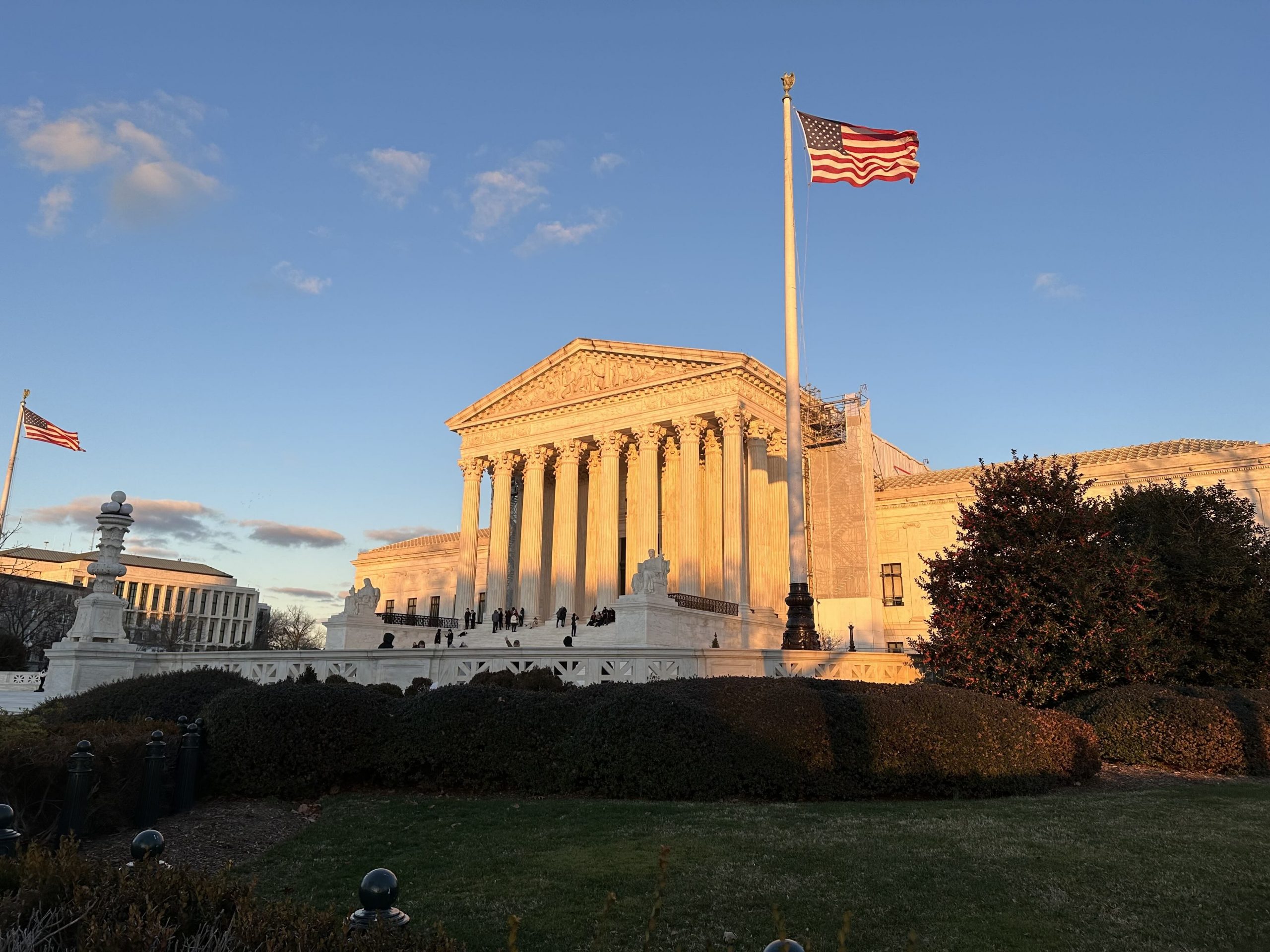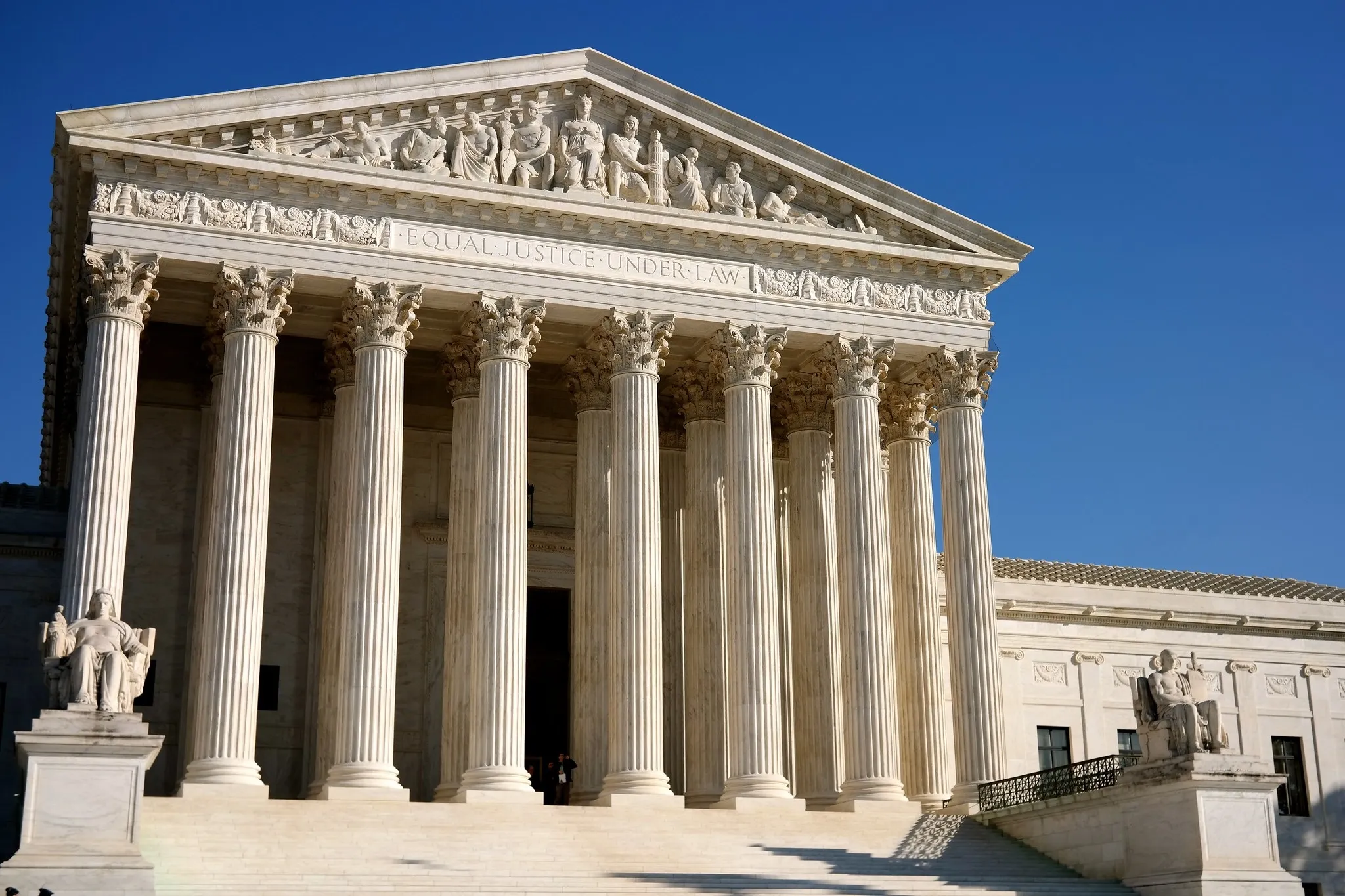Justices reject New York landlords’ petition to end rent-stabilization system
SCOTUS NEWS
on Feb 21, 2024
at 9:16 am
The Supreme Court on Tuesday rejected two petitions arguing that New York’s rent stabilization is unconstitutional. (Katie Barlow)
The Supreme Court on Tuesday morning issued orders from the justices’ private conference on Friday, Feb. 16. The court did not add any new cases to its merits docket, but Tuesday’s list of orders featured several notable denials of review – including in a pair of cases that the justices have been considering since late September. (The denial of a challenge to the admissions policy at a prestigious public magnet school in northern Virginia is covered in a separate story.)
The justices did not act on former President Donald Trump’s request to block the decision by a federal appeals court denying his claim of immunity from criminal charges that he conspired to overturn the results of the 2020 election. With the briefing on that request complete, the court’s disposition of Trump’s application on the emergency docket could come at any time, likely separately from the scheduled order list.
Last October, the justices declined to review a challenge to the constitutionality of New York’s rent-stabilization system, which applies to just under half of New York City’s rental housing and (among other things) limits rent increases and generally requires landlords to renew a tenant’s lease. On Thursday, the justices denied review in two cases presenting the same question, with Justice Clarence Thomas filing a statement regarding that denial.
The rent-stabilization system at the center of 74 Pinehurst v. New York and 335-7 LLC v. New York has been in place for over 50 years. It applies to approximately one million homes in New York City – 44% of all rentals. Under the system, a board appointed by the mayor sets the rate at which landlords may increase rents each year, and landlords must generally renew a tenant’s lease when it expires.
In 2019, the state enacted changes to the rent-stabilization system that were intended to provide more protection for tenants. Among other things, under the 2019 amendments landlords can only reclaim one rent-stabilized apartment for their own use or the use of their family. The law also allows courts to put an eviction on hold for a year even after determining that the tenant violated the lease.
In 74 Pinehurst and 335-7 LLC, a group of landlords went to federal court to challenge the rent-stabilization system. They argued that the system created both a “taking” of property under the Fifth Amendment, both as a general matter and as applied to them. For example, two of the landlords, Dimos and Vasiliki Panagoulias, want to set aside an apartment in their family’s building for another family member but are not permitted to do so. And the value of their buildings, the landlords said, has fallen as much as 60 to 70%. But the lower courts rejected those arguments, prompting the landlords to come to the Supreme Court earlier this year.
After considering the cases at 12 consecutive conferences, the justices denied review without any additional explanation.
In a two-page statement, Thomas emphasized that the “constitutionality of regimes like New York is an important and pressing question” on which the federal courts of appeals have taken different positions. But, Thomas explained, this case might not be a suitable one in which to consider the constitutionality of such regimes, because the challengers’ filings “primarily contain generalized allegations about their circumstances and injuries,” rather than the kind of analysis that would allow the justices to understand how the city’s regulations work. But “in an appropriate future case,” Thomas concluded, the justices should grant review “to address this important question.”
The justices turned down a petition by a man who was sentenced to 24 years in prison after he pleaded guilty to the attempted robbery of an armored car in Florida. Michael Bowe sought to file a successive motion for post-conviction relief in light of later Supreme Court rulings, but the question that he wanted the court to decide here was whether a bar imposed by federal habeas law on claims presented in second or successive habeas applications that were presented in earlier applications applies only to state prisoners or also to federal prisoners like himself.
In a statement regarding the court’s decision not to take up the question, Justice Sonia Sotomayor, joined by Justice Ketanji Brown Jackson, noted that Justice Brett Kavanaugh had “previously expressed his desire for the Court to resolve” a conflict among the federal courts of appeals on this issue. And Sotomayor added that there are “considerable structural barriers” that keep the question from reaching the Supreme Court. But it is nonetheless “an important issue for this Court to consider in a more important case,” she concluded.
The justices denied a petition for review filed by the Missouri Department of Corrections, challenging the dismissals of two jurors in an employment-discrimination case brought by Jean Finney, who is a lesbian. Both jurors indicated that “they could follow the law,” but they also described homosexuality as a sin.
A state appeals court upheld the dismissals on two grounds. First, the court held, the trial judge could conclude that the jurors could not fairly decide Finney’s case. And second, it continued, the jurors were dismissed because of their religious beliefs, not because they were Christians.
In a statement regarding the denial of review, Alito agreed that, for procedural reasons, the court was correct to turn down the department’s petition. However, he complained that the ruling by the appeals court, holding that “a person who still holds traditional religious views on questions of sexual morality is presumptively unfit to serve on a jury in a case involving a party who is a lesbian,” “exemplifies the danger that I anticipated in Obergefell v. Hodges,” the court’s 2015 decision striking down state bans on same-sex marriage – specifically, that “Americans who do not hide their adherence to traditional religious beliefs about homosexual conduct will be ‘labeled as bigots and treated as such’ by the government.” Although the Supreme Court’s ruling in Obergefell emphasized that “the decision should not be used in that way,” Alito acknowledged, he expressed concern that “this admonition is not being heeded by our society.”
The justices declined to take up a challenge to a ruling by a federal district judge in Washington state holding that a legislative district in that state violates Section 2 of the federal Voting Rights Act because it dilutes the voting power of Hispanic voters. A group of citizens that had intervened to defend the district after the state declined to do so had asked the Supreme Court to weigh in without waiting for the U.S. Court of Appeals for the 9th Circuit to hear their appeal. But the justices turned down that request on Tuesday.
In another case involving the same district, a different set of challengers argued that the district was an unconstitutional racial gerrymander. But in the wake of the federal district judge’s ruling that the district violates the Voting Rights Act, a majority of a three-judge district court dismissed that claim as moot – that is, no longer a live controversy. On Tuesday the justices threw out the three-judge court’s order and sent the case back to the lower court, instructing it to “enter a fresh judgment” from which the challengers could appeal.
Finally, the justices declined to review petitions filed by Sidney Powell and Lin Wood, who served as lawyers for Trump, appealing sanctions for their role in a case seeking to overturn the results of the 2020 presidential election in Michigan.
This article was originally published at Howe on the Court.






